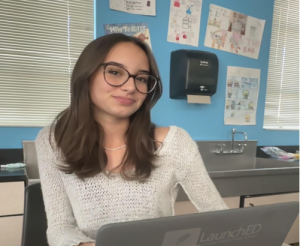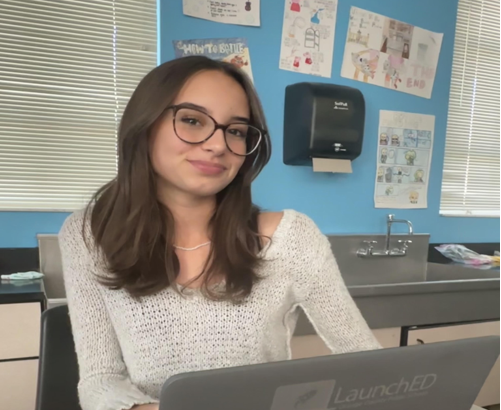A deep dive into course material.
By Victoria Vargas
Timber Creek High School (TCHS) contains a large variety of educational courses and electives for students to choose between. This wide range of activities allows each student to find something for them, ensuring a balanced, yet fun experience. One of the electives offered at TCHS is Early Childhood Education (ECE). This course is described as a “program designed to prepare individuals for employment in the early childhood field.” This course is a 4-year program in which students learn about child development, and the fundamentals of working with children. While this class may seem like one designed for future educators, it is enjoyed by many others, even those considering fields in entirely different industries. The Early Childhood Education elective is a class that is enjoyed by many.
When discussing the Early Childhood Education program, it is important to understand what the program in itself teaches. As assumed by the class title, students are taught how to work with young children. However, this class teaches more than how to be an educator in a preschool setting. According to Mirella Castillo, a sophomore in her second year of the program, “ You learn how to work with kids and you get to like experience it.” Students enrolled in this course are taught a range of information about young children, things such as different developmental milestones, and how to be a functional preschool teacher. While teaching students about young children, this program allows students to gain hands-on experience in being an educator. In level 2 of the program, students get to volunteer after school in the Wolf Pup Learning Center, while in levels 3 & 4, students get to work in the Wolf Pup Learning Center during class time. According to Castillo, “I like working with the kids. It’s just like that hands-on experience, it’s really interactive. I’m not only working with the kids, but I’m also working with other volunteers.” When volunteering in this program, students get to understand the basics of what will be asked of them in levels 3 & 4. With a program like this, a lot of support is required, but the teachers of this class have helped their students truly understand class content. According to Castillo, “Mrs Houston, she always goes in depth. I understand what she’s saying.” Mrs Houston, the teacher of ECE 2, 3 and 4, as well as director of the Wolf Pup Center has helped her classes understand the content taught, allowing them to apply this information when working with the kids. Freshman Adrian Cruz, a first year in the program states, “[Mrs. Wright] is definitely interactive- always walking around, trying to make sure everyone’s doing their thing. And she’s good at teaching. She always has the slides up so she demonstrates everything.” Mrs Wright, teacher of ECE 1, has done a great job of teaching DCF content, ensuring that her students have all the necessary tools to pass their certification exams, as well as excel in future levels of the program.
The Early Childhood Education course is often perceived as a class to take only if you want to become a teacher. However, many students feel that regardless of their future career path, this class is something that they will have enjoyed taking. Castillo, a student in her second year of the program states, “I do not see myself working with kids in the future, but know that I would like to have kids. I think this a good way to prepare myself for what it would be like to have kids.” This program not only teaches how to work with children in a preschool setting, but allows students the opportunity to learn about child development, allowing them to gain background knowledge on basic things children go through. This program has even been able to open students’ eyes to new opportunities, those they never saw themselves pursuing. Cruz, a first year program member, states, “At first I was like, there’s no way I could do that. But then, it seemed like a pretty cool thing to do. I might do it like a summer job.” This program has allowed those who never even considered the idea of teaching to truly get a sense of the experience. This has opened a number of doorways into different jobs that can be done with the training earned from this course, like teaching, baby-sitting, camp counselor, etc. This course provides students with the tools and materials to work with young children through classwork. According to Cruz, this program is beneficial as “you get your certification if you ever want to pursue something like that, which is pretty cool.” In level one of the program, DCF (Department of Children and Families) work is completed; students then take the seven tests required, finally earning their certification. This certification allows students to work in an educational setting, even outside of school grounds. Through this course, students can benefit, regardless of their future career aspirations.
As educational as this program is, students also have a lot of fun. This course offers a lot of enjoyable activities and classwork, making this a pleasant program on their schedule. The projects tend to be more craft and experience based, allowing students to let their creative side shine through, while still applying class content. According to Castillo, her favorite memory of the program was the sugar baby project. “Sugar babies during year 1 was really fun. It taught us how to take care of a kid. My teacher, Mrs Wright, made it fun; we had this one day where we spent class naming our sugar babies and dressing them up, and that was really fun.” This program revolves around a vast amount of interactive projects, and continues to this school year. According to Cruz, “So far, I had a really fun time doing the bottle feeding project, where you have to draw a comic strip. We did ours based on Dora the Explorer. Dora was taking care of Boots.” This class allows for students to be creative, yet still apply class content to their projects, working in group settings. Students in this class enjoy this course, describing it as a fun program. Castillo states, “ I get to see my friends and I get to see [Mrs.] Houston. The assignments we get are fun assignments; they’re not like boring stuff. It’s not like 1+1, that’s boring. It’s like decorating this dramatic play setting; that’s fun. They’re interesting, fun and interactive.” According to Cruz, “ It’s definitely a really fun program. There are fun projects to do, like I was talking about earlier the Sugar Baby Project and also we’re gonna be eating baby food pretty soon.” Overall the teachers of class have put their best effort in making this program something that students look forward to seeing on their schedule every day.
This program is one that is not only educational, but fun and exciting for students. The teachers of this program have ensured that members feel that this classroom is one that they can flourish and excel in. The Early Childhood Education program is a beneficial, highly recommended study by its students.

